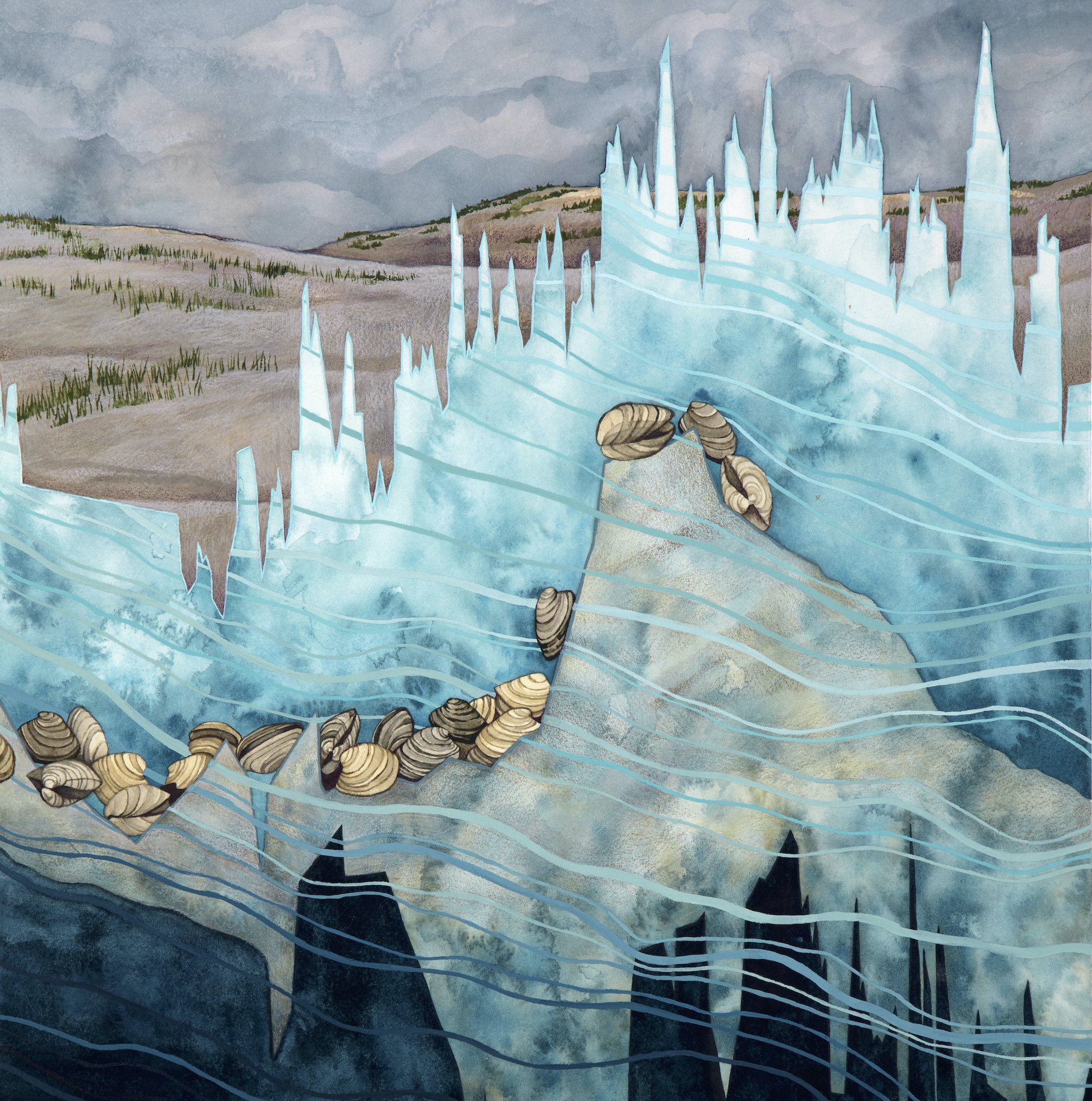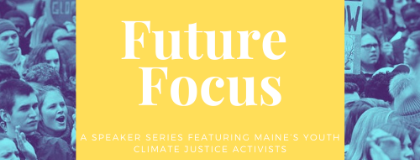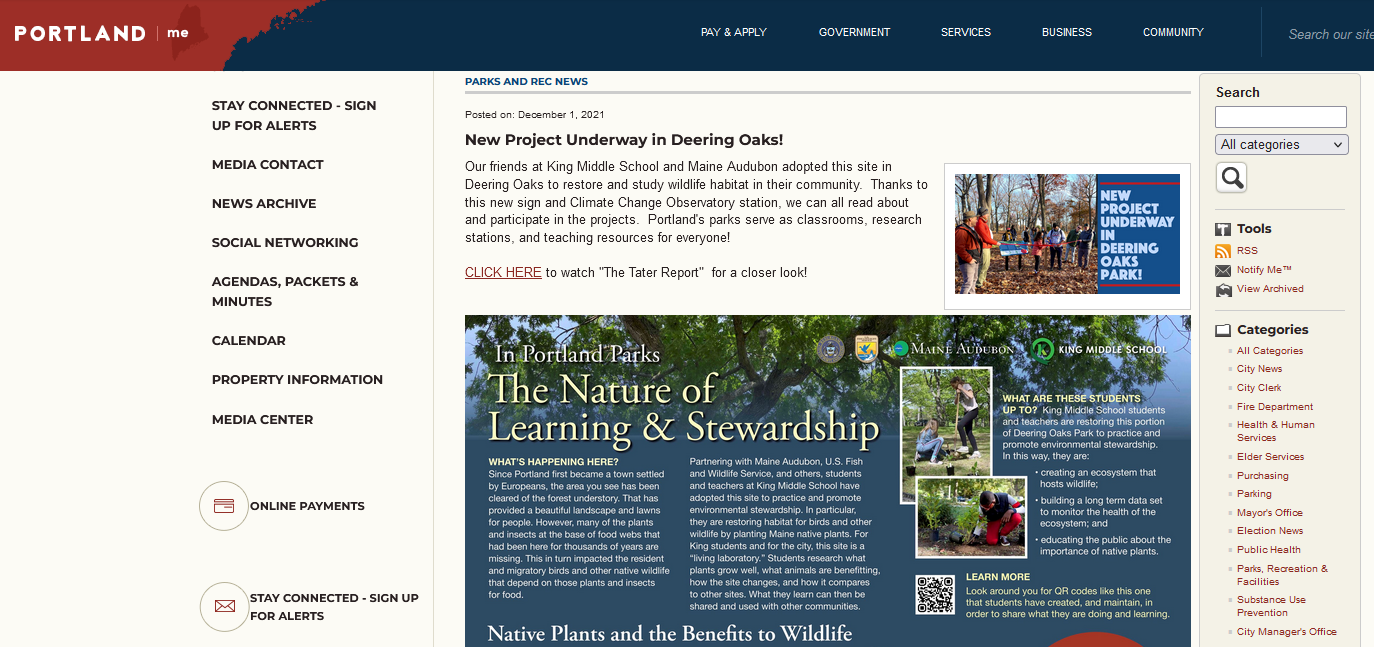Author: smcadmin
OUTLOOK Climate Art
Outlook explores variables that shape and influence individuals relationships with nature and how they seek to inspire, adapt and reimagine what conservation can look like moving forward in a world where Climate Change is affecting a broad range of human and natural systems.
OUTLOOK: Climate change art can help people connect on many levels with the challenging topic. We find ourselves asking what role does art play in communicating climate change and helping people express their fears, anxieties, and hopes.
We want to bring attention to an approach that we have found very exciting that uses data and art. Jill Pelto, both a scientist and artist, will be hosting a data-art workshop in the Fall of 2022 in collaboration with Long Island School in Maine with students who are utilizing Climate Change Observatory sites developed on Oceanside Conservation Trust’s (OCT) conserved properties.

 Jill Pelto: Science-Art Collaborations
Jill Pelto: Science-Art Collaborations
Watch and listen to Jill Pelto’s story below and visit her Instagram and website to learn more about her work.
“I am a climate change artist and my passion is constructing new ways to communicate science through art. Scientific research and data fuel the content of my artwork. I create pieces that raise awareness about interesting and important environmental topics. The key topic in my portfolio is climate change data: melting glaciers, rising sea levels, and the increasing use of renewable energy. I hope to cover both positive and negative issues that depict the reality of our current ecosystem.
Art is a uniquely articulate and emotional lens: through it I can address environmental concerns to raise awareness and inspire people to take action. I view art as a powerful platform to ground climate change discussion in everyday life and culture. My goal is to collaborate in order to reach a broader audience. I want to team up with fellow scientists, artists, and people from any discipline.
Nature is fascinating and beautiful, and I hope you will help me fight to preserve it!
I enjoy collaborations and commissions that help share climate stories in new ways. I have teamed up with scientific research groups, conservation organizations, and small businesses to use new platforms to communicate environmental change.” ~ Jill Pelto
January 2022: E-newsletter
Earthrise poem by Amanda Gorman
Amanda Gorman, December 2018, presented her original “Earthrise” four-minute poem as part of a Climate Reality Project “24 hours of reality” campaign. “It is a hope that implores us at an uncompromising core to keep rising up for an Earth more than worth fighting for.”
Earthrise poem by Amanda Gorman –
On Christmas Eve, 1968, astronaut Bill Anders
Snapped a photo of the earth
As Apollo 8 orbited the moon.
Those three guys
Were surprised
To see from their eyes
Our planet looked like an earthrise
A blue orb hovering over the moon’s gray horizon,
with deep oceans and silver skies.
It was our world’s first glance at itself
Our first chance to see a shared reality,
A declared stance and a commonality;
A glimpse into our planet’s mirror,
And as threats drew nearer,
Our own urgency became clearer,
As we realize that we hold nothing dearer
than this floating body we all call home.
We’ve known
That we’re caught in the throes
Of climactic changes some say
Will just go away,
While some simply pray
To survive another day;
For it is the obscure, the oppressed, the poor,
Who when the disaster
Is declared done,
Still suffer more than anyone.
Climate change is the single greatest challenge of our time,
Of this, you’re certainly aware.
It’s saddening, but I cannot spare you
From knowing an inconvenient fact, because
It’s getting the facts straight that gets us to act and not to wait.
So I tell you this not to scare you,
But to prepare you, to dare you
To dream a different reality,
Where despite disparities
We all care to protect this world,
This riddled blue marble, this little true marvel
To muster the verve and the nerve
To see how we can serve
Our planet. You don’t need to be a politician
To make it your mission to conserve, to protect,
To preserve that one and only home
That is ours,
To use your unique power
To give next generations the planet they deserve.
We are demonstrating, creating, advocating
We heed this inconvenient truth, because we need to be anything but lenient
With the future of our youth.
And while this is a training,
in sustaining the future of our planet,
There is no rehearsal. The time is
Now
Now
Now,
Because the reversal of harm,
And protection of a future so universal
Should be anything but controversial.
So, earth, pale blue dot
We will fail you not.
Just as we chose to go to the moon
We know it’s never too soon
To choose hope.
We choose to do more than cope
With climate change
We choose to end it—
We refuse to lose.
Together we do this and more
Not because it’s very easy or nice
But because it is necessary,
Because with every dawn we carry
the weight of the fate of this celestial body orbiting a star.
And as heavy as that weight sounded, it doesn’t hold us down,
But it keeps us grounded, steady, ready,
Because an environmental movement of this size
Is simply another form of an earthrise.
To see it, close your eyes.
Visualize that all of us leaders in this room
and outside of these walls or in the halls, all
of us changemakers are in a spacecraft,
Floating like a silver raft
in space, and we see the face of our planet anew.
We relish the view;
We witness its round green and brilliant blue,
Which inspires us to ask deeply, wholly:
What can we do?
Open your eyes.
Know that the future of
this wise planet
Lies right in sight:
Right in all of us. Trust
this earth uprising.
All of us bring light to exciting solutions never tried before
For it is our hope that implores us, at our uncompromising core,
To keep rising up for an earth more than worth fighting for.
Oceanside Conservation Trust Climate Change Observatory Sites
Oceanside Conservation Trust of Casco Bay (OCT) is part of the Southern Maine Conservation Collaborative’s Climate Change Observatory Network. OCT has installed a Climate Change Observatory (CCO) site on Long Island, Little Diamond Island and Cliff Island. Crowdsourced photos taken by community members, visitors and stewards at each of the CCO photo monitoring post locations are instantly integrated into the sites time lapse video to help monitor environmental changes that occur over time and to assist with the observation, measurement and documentation of long-term climate change trends in our communities.
Thank You For Your Support: Year End Recap 2021

We are grateful for the encouragement and strength so many people provided to help us advance our mission. Your input, participation and support is and will continue to be vital to our work. We encourage you to take advantage of the opportunities we provide as we push forward with our vision in 2022. We share our successes with you, our supporters, friends, partners and colleagues. We welcome newcomers with open arms to join us and learn more about the challenges we face and how we can all act to overcome them, as we come together to shape a better future for people and nature.
Click here to scroll through our Year End Recap
- Setting the stage for future trailblazers.
- Tackling issues at the root.
- Leading conversations on Maine’s changing climate.
- Supporting our communities to build climate resilience.
- Initiating innovative mechanisms to support land conservation especially in underserved communities.
By making even a small donation today, you play an important role in building our collective momentum to create effective change needed to protect and transform our communities for the benefit of all. Thank you!
Expanding the Definition of Conservation – 2021 Rundown





SMCC’s partnerships helped provide enriching virtual events throughout 2021. Providing a platform for the important people and projects here in Maine is one way we illustrate the many sides of conservation and specifically it’s role as a tool for land and climate justice.
Scroll through our 2021 Rundown.
December 2021: E-newsletter
King Middle School Deering Oaks Restoration Project
King Middle School students are the stewards of a portion of Deering Oaks Park in Portland, ME. Since 2016, King students have dedicated their time and focused their learning towards helping to restore the park to a native Maine ecosystem. Through the planting and maintenance of native species, King students are creating an ecosystem that hosts wildlife, educating the public and building a long term data set to monitor the health of the ecosystem. All of this work is accomplished through collaboration with local organizations and experts including: Maine Audubon; Southern Maine Conservation Collaborative; Friends of Deering Oaks; and US Fish & Wildlife.
Press Release: King Middle School To Join In Sign Unveiling
Press Herald / The Forecaster: School Notebook Dec. 1, 2021
About King Middle School
King Middle School’s mission is to awaken our students to the possibilities around them, as leaders in their own learning. To instill a sense of wonder and personal agency that can only be achieved through the exploration of real-world challenges and their potential solutions. To accept students as they are, and in so doing, encourage them to discover their best selves.
King Middle School is part of the Southern Maine Conservation Collaborative Climate Change Observatory Network, a photo monitoring program designed to work with environmental organizations and communities to assist with the observation, measurement and documentation of long-term climate change trends.




